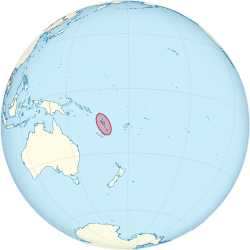**1. Historical Overview:**
– Vanuatu’s name derives from the words ‘vanua’ (land or home) and ‘tu’ (to stand), symbolizing its independent status.
– Settlement by Lapita culture people around 3,000 years ago.
– Notable Lapita sites include Teouma, Uripiv, Vao, and Makue.
– Roy Mata, a 16th-17th century chief, unified local clans.
– Lapita culture introduced crops and domesticated animals, spreading to Tonga and Samoa.
– Arrival of Europeans: Portuguese explorer Pedro Fernandes de Queirós in 1606, naming Espiritu Santo; French explorer Louis Antoine de Bougainville in 1768.
– Impact of Sandalwood Trade: Discovered by Peter Dillon in 1825, leading to trade boom and population decline.
– Arrival of Missionaries from 1839 onwards, leading to conversions and syncretism of Christianity with traditional beliefs.
– European Settlement and Agriculture: European settlers established plantations, transitioning from cotton to coffee, cocoa, bananas, and coconuts.
– Colonial Era (1906–1980): Establishment of the Anglo-French Condominium in 1906, land expropriation, and labor exploitation.
**2. Modern Vanuatu:**
– Vanuatu is an island country in Melanesia.
– Gained independence in 1980 and is a member of the United Nations and Commonwealth of Nations.
– HDI in 2021 was 0.607, ranking 142nd globally.
– Currency is the Vatu (VUV), with the calling code +678.
– Operates in the UTC+11 time zone with right-hand driving.
**3. Independence and Post-Independence:**
– Achieved independence on 30 July 1980.
– Brief Coconut War against Vemarana separatists.
– Prime Minister Walter Lini remained in office until 1991.
– Troops from Papua New Guinea quelled the Vemarana revolt.
– Post-Independence Challenges: Tensions, law and order issues, and political struggles.
**4. Political Developments:**
– Leadership Changes: Edward Natapei, Vohor, Ham Lini, and political turmoil.
– Recent Developments: Focus on healthcare, first COVID-19 case, election results, and challenges faced in 2020.
– Political Instability: Changes in prime ministers, financial scandals, and reform programs.
**5. Geography, Climate, and Natural Disasters:**
– Vanuatu’s Y-shaped archipelago with 83 small, volcanic islands.
– Geography: Highest point is Mount Tabwemasana, total area of approximately 12,274 square kilometers.
– Foreign Affairs: Non-Aligned Movement membership, opposition to Apartheid, and links with Libya and Cuba.
– Climate: Tropical climate with significant rainfall, high disaster risk ranking, and susceptibility to cyclones.
– Flora and Fauna: Rich biodiversity with terrestrial and marine species, including bats, birds, and marine molluscs.
Vanuatu (English: /ˌvɑːnuˈɑːtuː/ ⓘ VAH-noo-AH-too or /vænˈwɑːtuː/ van-WAH-too; Bislama and French pronunciation [vanuatu]), officially the Republic of Vanuatu (French: République de Vanuatu; Bislama: Ripablik blong Vanuatu), is an island country in Melanesia, located in the South Pacific Ocean. The archipelago, which is of volcanic origin, is 1,750 km (1,090 mi) east of northern Australia, 540 km (340 mi) northeast of New Caledonia, east of New Guinea, southeast of Solomon Islands, and west of Fiji.
Republic of Vanuatu | |
|---|---|
| Motto: "Long God yumi stanap" (Bislama) Nous nous tenons devant Dieu (French) "With God we stand" | |
| Anthem: "Yumi, Yumi, Yumi" (Bislama) "We, We, We" | |
 | |
| Capital and largest city | Port Vila 17°S 168°E / 17°S 168°E |
| Official languages | |
| Ethnic groups (2020) |
|
| Religion (2020) |
|
| Demonym(s) | Ni-Vanuatu (or rarely: Vanuatuan) |
| Government | Unitary parliamentary republic |
| Nikenike Vurobaravu | |
| Charlot Salwai | |
| Legislature | Parliament |
| Independence | |
• from the United Kingdom and France | 30 July 1980 |
• Admitted to the United Nations | 15 September 1981 |
| Area | |
• Total | 12,189 km2 (4,706 sq mi) (157th) |
| Population | |
• 2023 estimate | 335,908 (182nd) |
• 2020 census | 300,019 |
• Density | 27.6/km2 (71.5/sq mi) (188th) |
| GDP (PPP) | 2023 estimate |
• Total | $1.064 billion |
• Per capita | $3,001 |
| GDP (nominal) | 2023 estimate |
• Total | $1.002 billion |
• Per capita | $3,188 |
| Gini (2010) | 37.6 medium |
| HDI (2021) | medium (142nd) |
| Currency | Vatu (VUV) |
| Time zone | UTC+11 (VUT (Vanuatu Time)) |
| Driving side | right |
| Calling code | +678 |
| ISO 3166 code | VU |
| Internet TLD | .vu |
Vanuatu was first inhabited by Melanesian people. The first Europeans to visit the islands were a Spanish expedition led by Portuguese navigator Fernandes de Queirós, who arrived on the largest island, Espíritu Santo, in 1606. Queirós claimed the archipelago for Spain, as part of the colonial Spanish East Indies and named it La Austrialia del Espíritu Santo.
In the 1880s, France and the United Kingdom claimed parts of the archipelago, and in 1906, they agreed on a framework for jointly managing the archipelago as the New Hebrides through an Anglo-French condominium.
An independence movement arose in the 1970s, and the Republic of Vanuatu was founded in 1980. Since independence, the country has become a member of the United Nations, Commonwealth of Nations, Organisation internationale de la Francophonie, and the Pacific Islands Forum.


